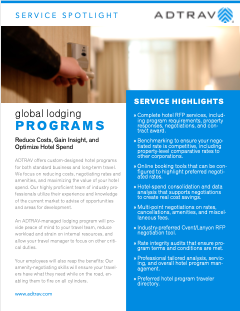The COVID-19 pandemic has created business challenges across the globe, negatively impacting many industries and creating unforeseen disruptions. One such disruption is already underway as we approach the upcoming hotel RFP season. Amid the COVID-19 crisis, travel buyers and hoteliers both are experiencing challenges and uncertainty in how to best navigate the traditional hotel RFP season—to strategize and negotiate or maintain the status quo?
In April, some industry associations recommended the rollover of 2020 rates into 2021 to lessen the impact to hoteliers, the chain’s operational teams, and the RFP process overall. But April was practically a lifetime ago, and a lot has changed since then. Some hotel chains have delayed RFP support and others are still determining their methodology. What hasn’t changed is that every travel program has unique needs and one size does not fit all. Flexibility and customization are key to creating the program your organization and travelers need to succeed.
Some hotel chains have asked their franchisees to rollover rates as well, often to the franchisees’ own detriment. For example, if Property A asks ABC Organization to rollover their 2020 rate into 2021, but Property B across the street is willing to renegotiate their rate (to what would very likely be a lower rate/increased amenities since occupancy levels are so low), then Property A is going to lose the business of ABC Organization.
This is Procurement 101: Supply and Demand, low occupancy puts the buyer in control—not the property or the chain. Hotel chains should not only support their local franchise owners but understand that it is illogical for clients not to renegotiate, leaving thousands of dollars of savings on the table. The pandemic has been hard on everyone. It’s the rule of supply and demand, and the supply has been low the past couple of years and hotels have enjoyed the benefits. Now the buyers will have an advantage with low demand.
- Proceeding with your RFP in the same timely fashion; remain flexible and understand that current RFP dynamics may cause delays. However, negotiating your specific travel needs is achievable.
- Reducing suppliers (initially) to your current needs will help shorten the RFP process and lessen the impact on the supplier RFP demands.
- Delaying your RFP launch until travel needs are more transparent. As demand increases, additional properties can be added.
- Negotiating dynamic rates vs. static rates or a combination of.
- Rolling over 2020 rates. (This will result in foregoing savings opportunities; ADTRAV does not recommend this approach.)
With all of these, flexibility will be key. With chains having reduced staff, anticipate possible delays in responses from the chain as well as any properties solicited directly. However, with a significant number of corporations preferring to negotiate their 2021 terms, it is feasible chains will ensure support.
Regardless of your approach, keep these in mind during your decision-making process:
- Focus on higher-volume supplier needs to lessen the number of properties needed to meet your current demand. As travel increases, properties can be added.
- Remain focused on reducing rates and re-evaluate key amenities—breakfast, parking, Wi-Fi, etc. Keep in mind that changes may continue to occur with breakfast and parking options, and restrictions and comfort levels will dictate the property offerings.
Learn How ADTRAV Can Give You Complete Control of Your Lodging Spend


